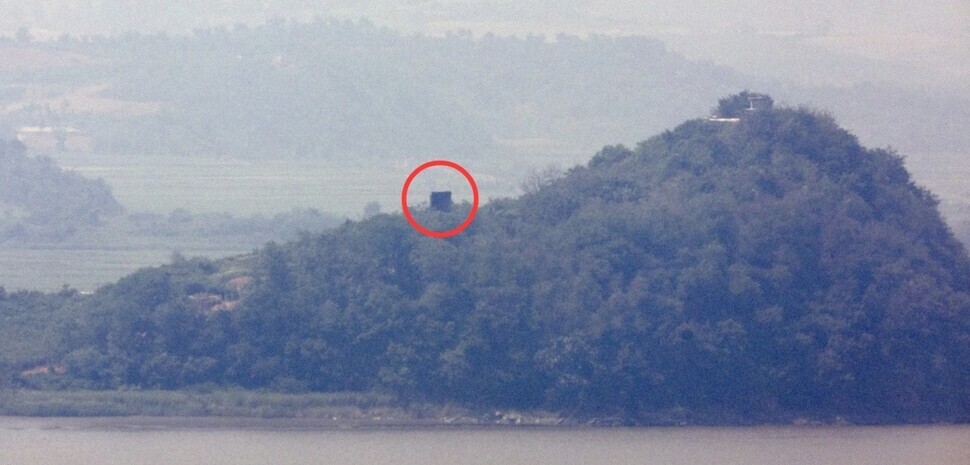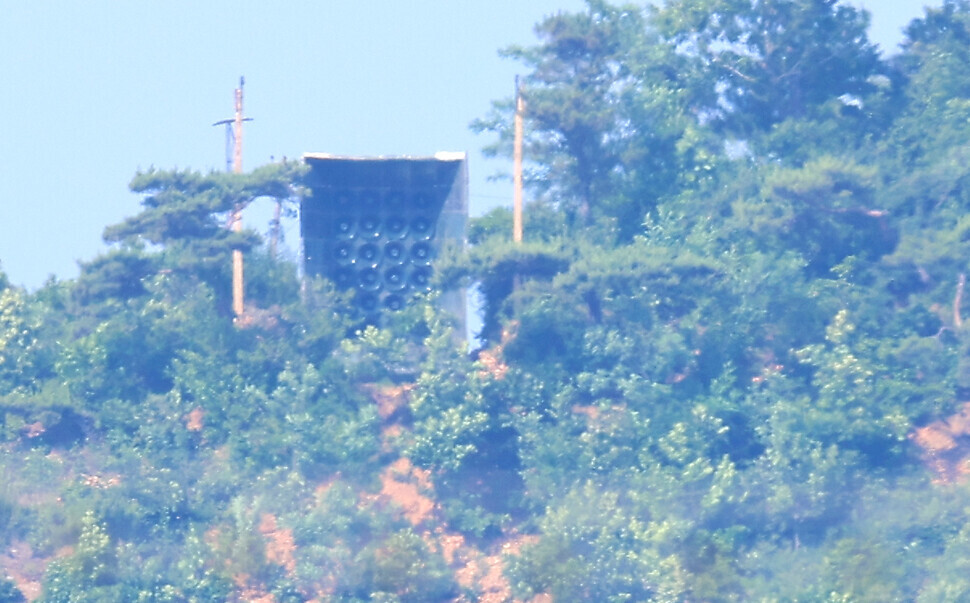hankyoreh
Links to other country sites 다른 나라 사이트 링크
Enough trash-slinging — it’s time to pursue ‘strategic communication’

Balloons have been the cause of a fracas between South and North Korea for more than a month now, as defector groups in South Korean launch balloons filled with propaganda leaflets and the North Korean authorities launch balloons carrying garbage.
What if those objects flying across the border weren’t balloons, but bombs or missiles? Might that actually happen if things go badly? The fact is that such frightening visions can’t be simply ignored or dismissed.
The fracas that has brought politically and socially important issues onto press headlines (at least in South Korea) can be summarized as a typical tit for tat. As usual, the balloons were first launched by South Korea (more specifically, private groups in the South). On May 10, a defector group called Fighters for a Free North Korea (led by Park Sang-hak) launched 300,000 propaganda pamphlets in 20 large balloons into North Korea. Two weeks later, the North Korean authorities followed through on a threat to send hundreds of balloons carrying garbage and excrement in two batches on May 28 and June 2.
Then on June 6, Fighters for a Free North Korea launched another 200,000 leaflets across the border in ten more balloons. That prompted another response from North Korea, which launched hundreds of trash-filled balloons on June 8 and 9. (That came in four separate launches, with some 1,600 balloons falling in South Korean territory).
The South Korean government decided to fully suspend the Sept. 19 comprehensive military agreement with the North on June 4 and to activate propaganda loudspeakers along the Demilitarized Zone (DMZ) after six years of silence on June 9. In response, North Korea appears to be reinstalling its own propaganda loudspeakers along the border.
As of the time of writing, on June 13, both the balloons and the loudspeakers are quiet. Perhaps both South and North Korea have carried out an adequate degree of “retaliation” for each other’s “provocations” and subjectively believe they’ve made their point.
But the South Korean government (via the Ministry of Unification) reconfirmed on June 10 it doesn’t intend to stop the launches, and Kim Yo-jong, sister of North Korean leader Kim Jong-un, threatened on the same day that if South Korea continues with its leaflet launches and loudspeaker broadcasts, it will see something new from the North. So it’s hard to say what will happen next.
The shame of not being ashamed
Propaganda leaflets and loudspeaker broadcasts have been a tool of psychological warfare that have been in constant use ever since the Korean War. Combined with the rapid advancement of physical weapons, this points to the retardation — or more accurately, the backwardness or degeneracy — of the collective mindset that’s at the root of our security problem.
The word “trash” that has emerged in the latest dispute is an apt descriptor of what is being launched not only by North Korea but also by South Korea. The defector groups’ balloons contain leaflets printed with vulgar rumors about the supreme leader and crude and nearly pornographic composite images, flash memory drives containing K-pop songs that are banned under North Korean law, and dollar bills that might be handed out to beggars. From the perspective of the North Korean government, what could that be if not despicable rubbish?
“North Korea — after firing artillery shells into the West Sea and launching missiles — recently carried out a despicable provocation that would make any normal country ashamed of itself,” Yoon said about North Korea’s filth-filled balloons in a memorial service on Memorial Day, on June 6. But it’s unclear about which side is better positioned to make that remark. Perhaps the really shameful thing is that Yoon doesn’t feel any shame himself.
What’s twice as shameful is that the defector groups that are launching the propaganda leaflets are receiving financial assistance from the US. Fighters for a Free North Korea is receiving funding from the National Endowment for Democracy (NED, established in 1983), technically a nongovernment organization but actually funded by the US government via the State Department and the Central Intelligence Agency. That information is listed on the NED website.
What emerges is an absurd, embarrassing, doleful and dangerous picture of the ROK-US alliance, which pursues the apparently unimpeachable values of democracy advocacy and the freedom of expression, while occasionally endangering the entire country’s national security to prop up the livelihood of a handful of North Korean defectors.
At this juncture, South Korea needs to work on its strategy for psychological warfare. As much as the characteristics of physical warfare may change, there can be no war without psychological operations, or psyops. Since humans can be regarded as energy- and information-processing systems, psychological warfare has grown in importance in the information age.
When viewed in terms of the larger category of information warfare, psychological warfare is the organized effort to exploit information to impact the values, convictions, emotions, and mentality of enemy groups and individuals so as to achieve the desired results (which could include the enemy’s psychological discouragement, demoralization, desertion, and defection).

Information warfare is aimed not only at military personnel but also at virtually everyone on the other side, including leaders, government bodies, corporations and the general public. In fact, such warfare is carried out not only against enemies but also allies and does not distinguish between wartime and peacetime. While the goals of psychological warfare today remain the same, it’s diversifying and advancing in its methodology through groundbreaking advancements in information technology.
The US military has a clear lead in the area of psychological warfare. Psyops is meticulously documented in each section of the armed forces, as well as in the Joint Chiefs of Staff and the Department of Defense, and overseas operations are handled by a separate department attached to each regional military command. Since the War in Afghanistan, the US military has used the oddly lyrical expression “hearts and minds” as another term for psychological warfare.
Furthermore, “strategic communication” has been used in the sense of public relations or public affairs, and public affairs officers have become strategic communication officers. These fancy phrases most effectively express the methods and goals of psychological warfare. But despite reading all those field manuals on psychological warfare, the US military unfortunately failed to win the hearts and minds of the people of Afghanistan and is still failing to do so in locations around the world. Ultimately, the US has basically failed at strategic communication.
Only seeking the other side’s weak points
It’s true that psychological warfare between South and North Korea won’t go away until the Korean War comes to an official end. But granting the inevitability of waging psychological warfare in this interim phase, we still need a more strategic approach that dispenses with outdated methodology. In other words, psychological warfare needs to be waged by the state as a means of keeping the peace and preventing a shooting war.
Launching propaganda leaflets will never achieve the original aims of psychological warfare; rather, it will only stoke the antipathy of the North Korean leaders and public. It doesn’t take a degree in psychology for people to intuit when someone is trying to win their “hearts and minds.”
South Korea’s secret weapons in its psychological warfare against the North are its democratic system and its economic prosperity (especially compared to the North). But in a cool-headed appraisal, even those two factors are fragile and contain their own downsides. South Korea’s democracy is always capable of devolving into mob rule, and its society and economy are fraught with inequality. Another undeniable weakness in South Korea is its structural dependence on the US.
North Korea’s strength is the independence and unity of a society organized around a leader. But that very strength entails the fundamental problems of diplomatic isolation and the rejection of universal democratic values. The North’s most serious practical weakness is the chronic weakness of its economy and the public’s standard of living. South and North Korea’s psychological warfare has always originated with assaults on each other’s weak points.
It's time for a paradigm shift in psychological warfare against North Korea, moving from a zero-sum game of trading insults to a positive-sum game of mutual respect and strategic communication. That could also serve the political interests of the Yoon administration.
One convenient thing about North Korea is that even when inter-Korean relations are on ice and the Internet is blocked, communication with one person (Kim Jong-un) is equivalent to communication with the entire country.
It’s time to dust off some age-old wisdom. We ought to refrain from criticizing North Korea and consistently announce policies that underline our own strengths.
North Korea is listening to every word we say. The spokespersons at the presidential office, the Ministry of National Defense, the Ministry of Unification and the Ministry of Foreign Affairs need to become our strategic communication officers.
By Moon Jang-nyeol, former professor at Korea National Defense University
Please direct questions or comments to [english@hani.co.kr]

Editorial・opinion
![[Editorial] Exploiting foreign domestic workers won’t solve Korea’s birth rate problem [Editorial] Exploiting foreign domestic workers won’t solve Korea’s birth rate problem](https://flexible.img.hani.co.kr/flexible/normal/500/300/imgdb/original/2024/0626/5517193887628759.jpg) [Editorial] Exploiting foreign domestic workers won’t solve Korea’s birth rate problem
[Editorial] Exploiting foreign domestic workers won’t solve Korea’s birth rate problem![[Column] Kim and Putin’s new world order [Column] Kim and Putin’s new world order](https://flexible.img.hani.co.kr/flexible/normal/500/300/imgdb/original/2024/0625/9617193034806503.jpg) [Column] Kim and Putin’s new world order
[Column] Kim and Putin’s new world order- [Editorial] Workplace hazards can be prevented — why weren’t they this time?
- [Editorial] Seoul failed to use diplomacy with Moscow — now it’s resorting to threats
- [Column] Balloons, drones, wiretapping… Yongsan’s got it all!
- [Editorial] It’s time for us all to rethink our approach to North Korea
- [Column] Why empty gestures matter more than ever
- [Editorial] Seoul’s part in N. Korea, Russia upgrading ties to a ‘strategic partnership’
- [Column] The tragedy of Korea’s perpetually self-sabotaging diplomacy with Japan
- [Column] Moon Jae-in’s defense doublethink
Most viewed articles
- 1Nuclear South Korea back up for debate as North cozies up to Russia
- 2Dispatched into unknown danger, foreign day laborers were defenseless against blaze
- 3‘Disposable’: How illegal temp work practices push migrants in Korea into risky jobs
- 4CIA record confirms US ‘completely destroyed’ Seoul’s Haebangchon in 1950 bombardment
- 5[Editorial] Exploiting foreign domestic workers won’t solve Korea’s birth rate problem
- 6After 7 years, South Korea resumes live-fire drills on islands a stone’s throw from North
- 7How 17 km of river could be a fertile bed for NK-China-Russia cooperation
- 8Gangnam murderer says he killed “because women have always ignored me”
- 9[Seoul travels] Mullae: a place to get lost and perhaps rediscover yourself
- 10A Filipina fights for dignity after being forced into prostitution at Korean camptown bar